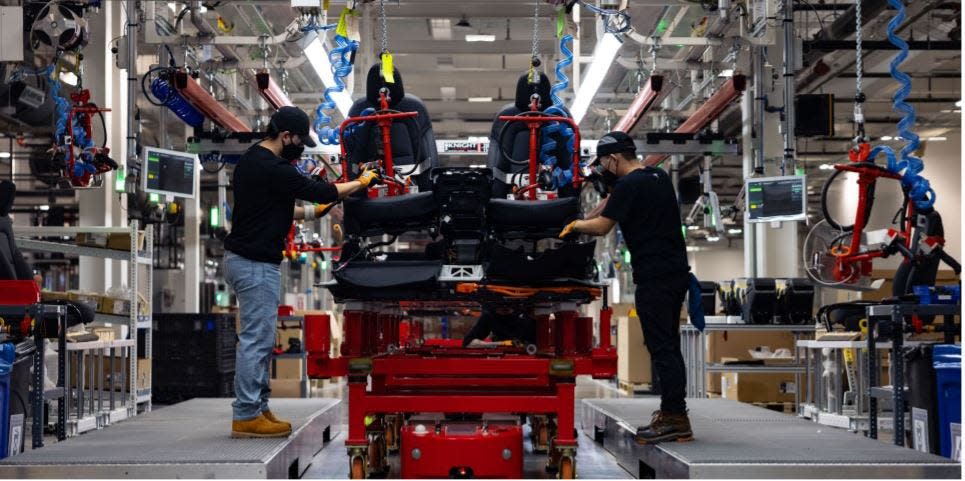Worrisome news for Texas economy: Manufacturing growth slows sharply

Manufacturing growth in Texas declined sharply in June, and demand dropped for the first time in two years, according to a new report.
The June decline marked the second straight month of slowing growth, and factory output grew only marginally, according to a survey from the Federal Reserve Bank of Dallas released Monday.
The index for general business activity, which measures broader business conditions, fell 10 points to -17.7, according to business executives responding to the Texas Manufacturing Outlook Survey
That's the lowest level since May 2020, when the COVID-19 pandemic pummeled manufacturing activity. The Dallas Fed said the new reading signals that activity declined, as it came in well below the zero threshold that separates expansion from contraction.
The Dallas Fed report is based on a series of questions on prices, wages and revenue restraints asked of 366 Texas business executives from June 14-22 in an anonymous survey.
Tesla: Elon Musk says factories in Austin, Berlin are losing billons of dollars
"Perceptions of general business conditions worsened for a second month in a row,” said Emily Kerr, Dallas Fed senior business economist. “A continued bright spot in the survey was the employment index, which fell but remained elevated, continuing to indicate robust hiring."
However, uncertainty grew, with manufacturers voicing concern over inflation, continued supply-chain woes and an economic slowdown, Kerr said.
"When asked about factors restraining revenues, firms increasingly reported weak demand, though supply-chain disruptions and staffing shortages were still the top responses," Kerr said.
Central Texas has been undergoing a manufacturing boom, led by electric automaker Tesla, which has made Austin its headquarters. The company opened a $1.1 billion manufacturing facility in southeast Travis County, where it has begun production of its Model Y electric SUVs. Tesla CEO Elon Musk last week said Tesla's facilities in Austin and Berlin are losing billions of dollars as supply chain issues and other problems are hampering the company's plans to increase production.
Tech giant Samsung recently picked a site near Taylor to build a $17 billion semiconductor manufacturing facility. This comes as the Central Texas region's unemployment rate currently stands at 2.7%.
Proposed Applied Materials facility in Hutto: Tax breaks could top $100 million
All the main indicators of the Dallas Fed index predicted a slowdown or a decline in activity. The new orders index decreased to -7.3 from 3.2 in May, its first negative reading in two years.
The production index fell from 18.8 to 2.3, reaching its lowest reading since May 2020. The growth rate of orders index pushed further negative, from -5.3 to -16.2. The outlook uncertainty index shot up to 43.7, a 17-point jump from May.
"We are experiencing the highest unfilled job rates in recent history," said one survey respondent who works in the metal manufacturing industry. "Workforce shortages are crippling manufacturing sectors. We have found that despite significant wage increases, rich benefits and hiring bonuses for starting positions, both skilled and unskilled, we are struggling to find employees."
Other employers are grappling with different challenges. "We lost approximately $2.5 million in sales that would have been shipped to Russia," a chemical manufacturing executive said.
Austin expansion: NXP seeking up to $140 million in tax breaks
A respondent in the computer and electronic manufacturing said: "Supply-chain disruptions not only limit what products can be built, but the constantly changing availability dates increase challenges related to scheduling and hiring and fundamentally reduce the efficiency of operations.
"Not only are we facing rising costs on all sides and supply-chain delays, but we are also losing efficiency in operations with all the disruptions," the respondent said. "This adds even more to the cost burden, which will ultimately be passed to consumers."
An executive in printing and product manufacturing said: "Retail demand is softening; because everything is so expensive, the consumer is not buying as much as they were 30 days ago. In addition, our customers have a bulge of inventory due to a year of hoarding."
Expectations for wage and price growth this year continue to rise, Kerr said. Texas firms now expect 7.4% wage growth in 2022, on average, and 9.7% input price growth. They expect to raise selling prices by 7.1% this year, on average.
For 2023, Texas firms expect 6% wage growth in 2023, on average, and 7.1% input price growth. They expect to raise selling prices by 5.7% next year, on average.
This article originally appeared on Austin American-Statesman: Texas manufacturing growth slows sharply as demand drops

